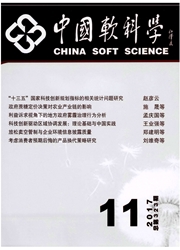

 中文摘要:
中文摘要:
指出资源约束下虚拟水贸易的实施目标,基于节水效应及经济价值两个角度阐释虚拟水战略的经济学内涵,从技术层面、产业层面及区际层面分别建立数理分析模型,论证虚拟水贸易如何促进缺水地区的经济增长,并在计算2005-2009年我国国际间农产品虚拟水流动格局的基础上,对虚拟水贸易在我国经济增长中的贡献份额进行实证分析。研究得出:提高水价是虚拟水战略实施的根本路径依赖,辅以适当的财政补贴可以在实现节水的同时增加农户收益;虚拟水贸易将引发产业间的用水转移,优化水资源配置并实现当地产出的帕累托改进;根据比较优势理论实施区际间虚拟水贸易,能够有效缓解缺水地区的水资源短缺,更大范围内发挥虚拟水的经济价值,促进当地经济发展;2009年,我国农产品对外虚拟水贸易对国内经济增长的贡献份额为24045.05亿元,约占当年GDP的7.06%。
 英文摘要:
英文摘要:
This paper points out the implementation objectives of the virtual water trade(VWT) with constrained resource,explains the economics meanings of virtual water strategy from the virtual water's quantity and economic value.And then,based on three mathematical models respectively at technical level,industrial level and regional level in the implementation process of VWT,this paper demonstrates the action mechanism of VWT on the regions' economic growth,and finally makes the initial estimates on the economic contribution portion of VWT in the process of China's agricultural foreign trade from 2005 to 2009 based on the calculation of the flow state of virtual water.The research finds that: 1) increasing water price is the fundamental path dependence in the implementation of the virtual water strategy,and the appropriate financial subsidies by the government can not only promote water saving but also increase the farmers' income;2) water transfer between the agricultural sector and industrial sector can improve the economic value of virtual water to achieve Pareto improvement of local output;3) based on comparative advantage theory,the implementation of interregional VWT can effectively alleviate the water shortages in water-scarce regions,further develop the economic efficiency of water usage and promote local economic development;4) according to the estimation,the economic contribution share of VWT in the process of China's agricultural foreign trade is 2.40 trillion yuan in 2009,accounting for 7.06% of GDP in the same year.
 同期刊论文项目
同期刊论文项目
 同项目期刊论文
同项目期刊论文
 Research on Energy Conservation and Emission Reduction Based on the Economic Transformation and Upgr
Research on Energy Conservation and Emission Reduction Based on the Economic Transformation and Upgr 期刊信息
期刊信息
